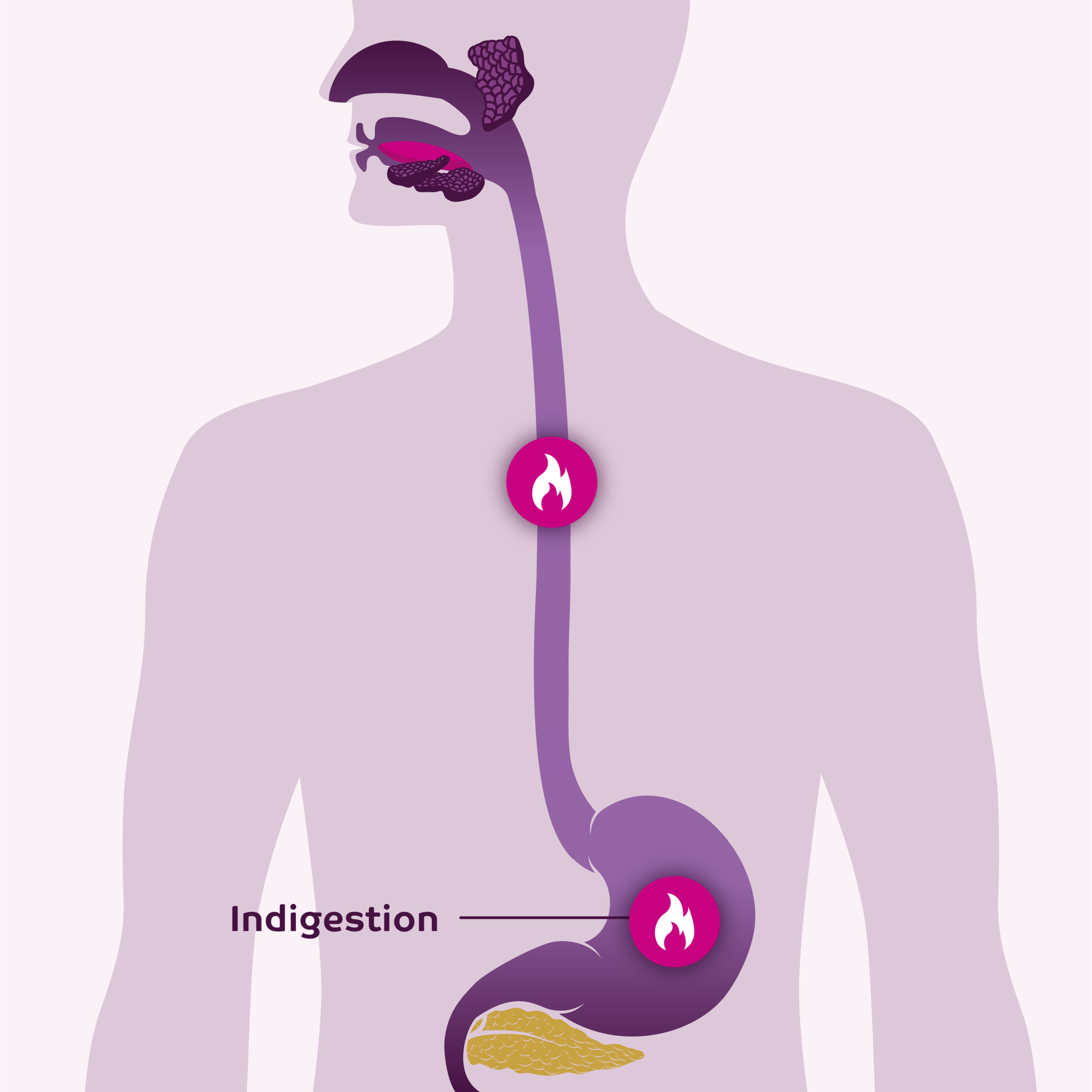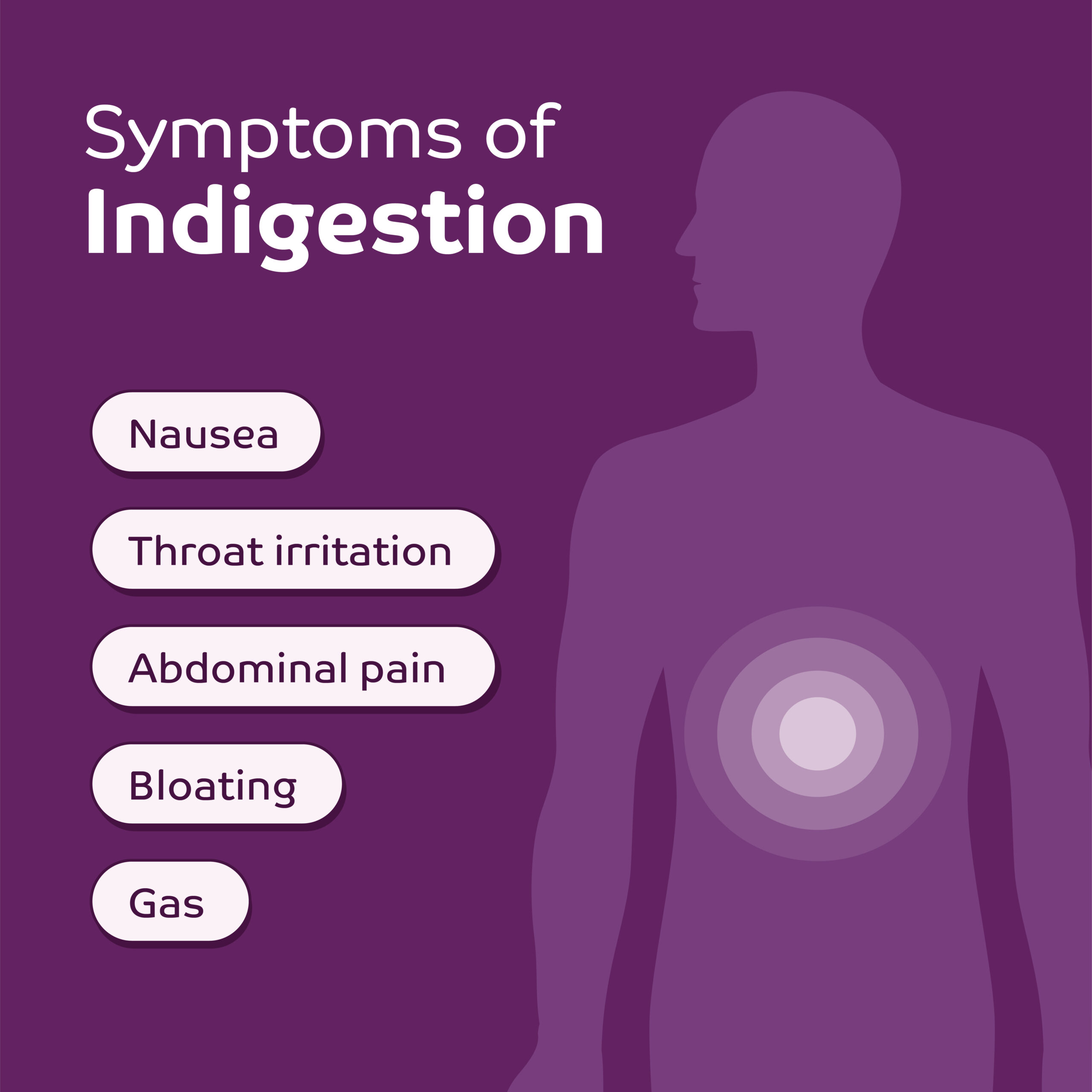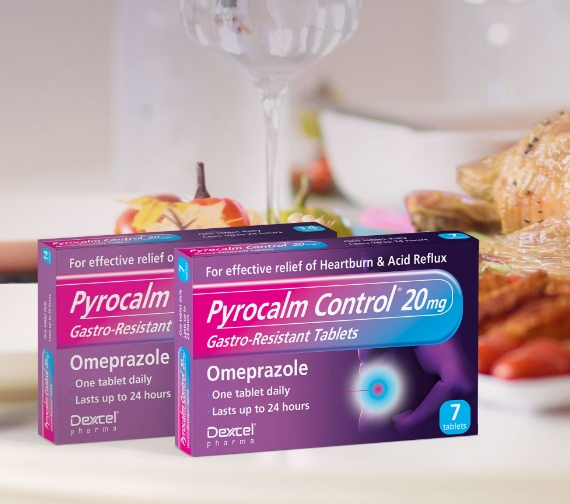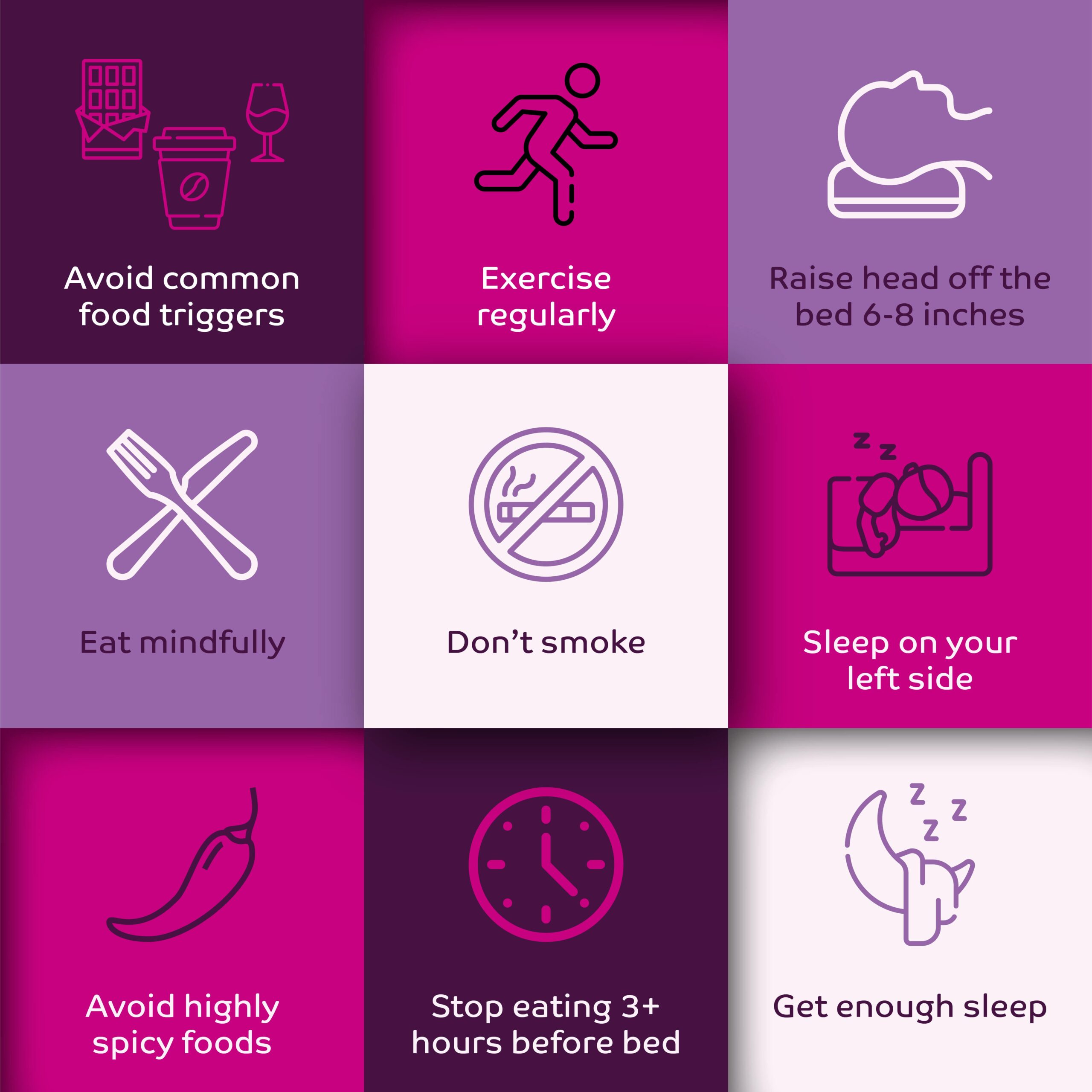What is Indigestion?
Indigestion, also known as dyspepsia, is an unpleasant, sometimes painful sensation at the top of the stomach or lower part of the chest which usually occurs after eating or drinking.1 It’s a common condition which is rarely not a sign of anything serious and you can treat it yourself.1
What does Indigestion feel like?
Indigestion symptoms range from a mild feeling of discomfort in the upper abdomen to fairly severe pain.1 You may also experience the burning sensation of heartburn or after eating a meal, have a general feeling of fullness (bloating and heaviness) and discomfort in the upper abdomen.1 It may also be painful sensation below the breastbone – you could have any one of these symptoms or a combination.1

Indigestion symptoms
Most of us experience indigestion from time to time and we can all experience it in several different ways.2
The most common Indigestion symptoms include2:
- Heartburn – a painful burning sensation in the chest, which often occurs after eating or drinking
- Burping and farting
- Bloating – commonly caused by trapped wind, or gas, in your gut3
- Feeling sick
- Bringing up food
- Bitter tasting fluids or an unpleasant sour taste in your mouth which is caused by acid reflux4
How long does Indigestion last?
Virtually all of us experience indigestion at some point and it is self-treatable. Symptoms can last for a few hours and may recur for a few days.5 It tends to go away on its own or after dietary and lifestyle changes have been made.5

Why Does Indigestion Happen?
Indigestion is often caused by acid reflux irritating the throat or stomach lining.2 Acid reflux is often caused by certain dietary or lifestyle factors such as specific food and drink triggers, smoking, being overweight or stress and anxiety. 2
Common Indigestion Causes
Indigestion has several causes which are often dietary and lifestyle habits such as overeating or rushing our food.1
Common causes of indigestion include2:
- Eating too quickly or eating too much
- Certain types of food and drink including fatty or spicy food, coffee, tomatoes, chocolate and alcohol
- Being overweight or smoking which can also increase the risk of acid reflux
- Stress & anxiety
- Pregnancy – hormonal changes and the growing baby pressing against your stomach can cause indigestion and heartburn in pregnancy. It’s more common after 27 weeks.2
- Medicines such as anti-inflammatory painkillers like ibuprofen

How to get rid of indigestion? Indigestion Relief & Treatment
There are a number of simple lifestyle changes you can make to reduce your risk of getting indigestion as well as over-the-counter remedies such as indigestion tablets which neutralise stomach acid such as antacids and alginates which coat the gullet with a protective layer. See below for a list of different ways to treat indigestion:
Ways To Treat Indigestion at Home
Typically, you won’t need to see a GP, you can aid indigestion with some simple self-care and lifestyle tips such as2:- Cut down on certain drinks such as tea, coffee, or carbonated drinks such as cola.
- Trying to lose weight if you are overweight
- Try eating smaller meals more often
- Before going to bed, try not to eat 3 to 4 hours beforehand
- Try not to eat foods that are rich, high in fats or spicy
- Try to avoid drinking alcohol or smoking
- Raise your head and shoulders when lying in bed, this can prevent stomach acid from coming up when you sleep
- Avoid aspirin or ibuprofen as this can make Indigestion worse
Natural home remedies for Indigestion
There are also natural home remedies you may find benefit your symptoms although there is no firm evidence to support the effectiveness of natural remedies.6 These include6:- Sipping a cup of cooled boiled water
- A teaspoon of baking soda into a glass of water may help to neutralise stomach acid and relieve trapped wind and bloating. Adding lemon juice may help to prevent gas.
- Ginger tea may help to improve digestion and relieve upset stomach
- Camomile tea is believed to calm the stomach
- Mixing a teaspoon of apple cider vinegar with half a cup of water could reduce indigestion
- One-and-a-half teaspoons of dried peppermint in a cup of hot water may bring relief to indigestion symptoms.
Indigestion Tablets
If dietary and lifestyle changes aren’t proving effective, pharmacists can advise on over-the-counter treatment PPIs (proton pump inhibitors).2 They may recommend stronger treatments such as indigestion tablets or omeprazole over the counter. PPIs are medicines which reduce the amount of acid your stomach makes, such as omeprazole.7
Pyrocalm Control, is a branded over the counter omeprazole, the main ingredient prevents the proton pump enzymes, which produce acid to aid digestion, from working properly therefore reducing the amount of acid in the stomach. Pyrocalm can be used during pregnancy and while breastfeeding if other dietary and lifestyle changes aren’t working.
Medicines can affect the unborn baby. Always talk to your doctor or pharmacist before taking any medicine during pregnancy. If you buy indigestion tablets or omeprazole over the counter; from a pharmacy or supermarket you’re advised to check with your GP before taking it for longer than two weeks.6

Indigestion Medical Help
Indigestion symptoms are rarely a cause for concern1 but you should contact your GP if you experience any of the following2:
- Get persistent indigestion
- Get severe pain with your Indigestion
- Are unintentionally losing weight
- Have difficulty swallowing (or Dysphagia)
- Have iron deficiency/anaemia
- Keep being sick
- Feel a lump in your stomach
- Have blood in your poo or vomit
Related blog posts
References:
- https://gutscharity.org.uk/advice-and-information/symptoms/indigestion/
- https://www.nhs.uk/conditions/indigestion/
- https://www.nhs.uk/conditions/bloating/
- https://www.nhs.uk/conditions/heartburn-and-acid-reflux/#:~:text=Check%20if%20you%20have%20acid,mouth%2C%20caused%20by%20stomach%20acid
- https://khealth.com/learn/indigestion/how-long-lasts/#:~:text=Many%20cases%20of%20mild%20indigestion,loss%20or%20loss%20of%20appetite
- https://www.wakefieldccg.nhs.uk/fileadmin/site_setup/contentUploads/Connecting_Care/Partners_website_documents/Care_Home_Resources/Self_Care_Guides_for_staff/Indigestion-Self-Car.pdf
- https://www.nhs.uk/medicines/omeprazole/about-omeprazole/
- https://www.nhs.uk/medicines/omeprazole/about-omeprazole/
Self Care Advice
Pyrocalm Control® 20mg Gastro-Resistant Tablets. For the short-term treatment of reflux symptoms in adults.
Contains 20 mg Omeprazole. Always read the label. Medicines can affect the unborn baby.
Always talk to your doctor or pharmacist before taking any medicine in pregnancy.











